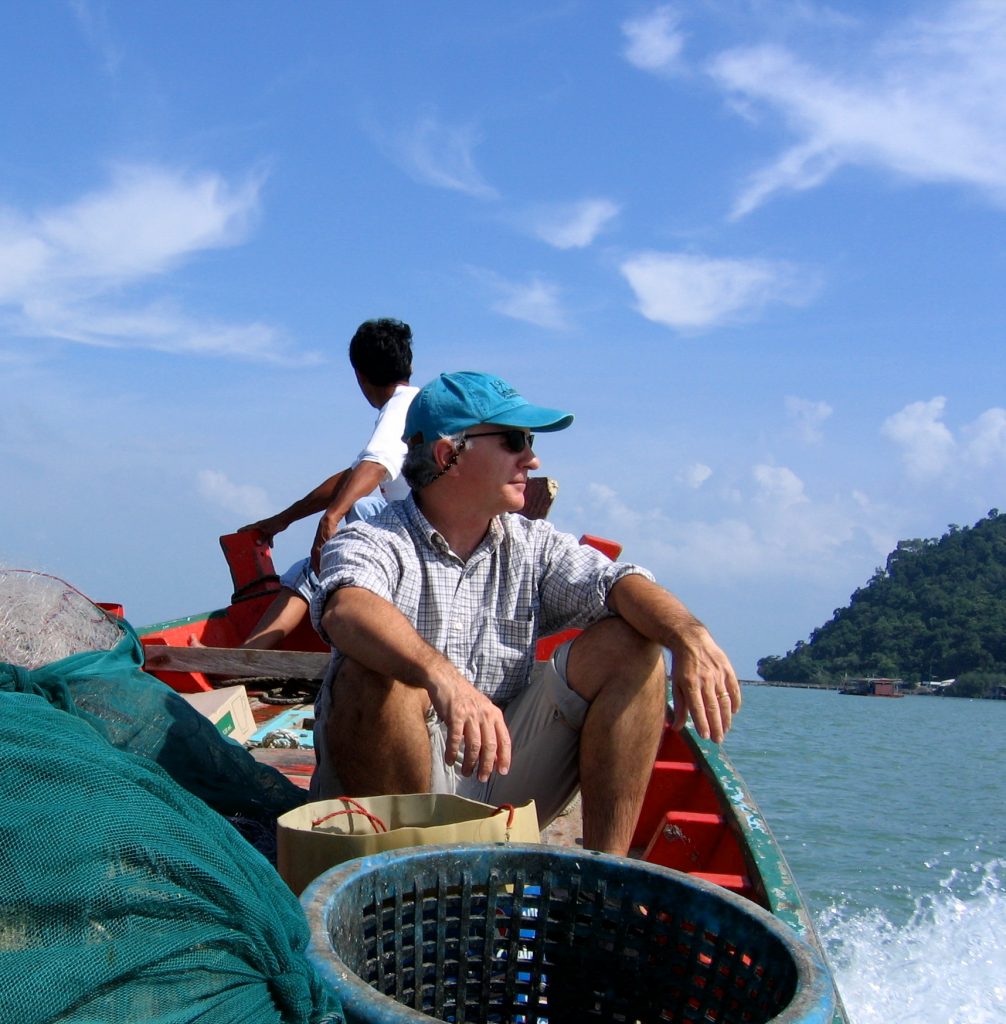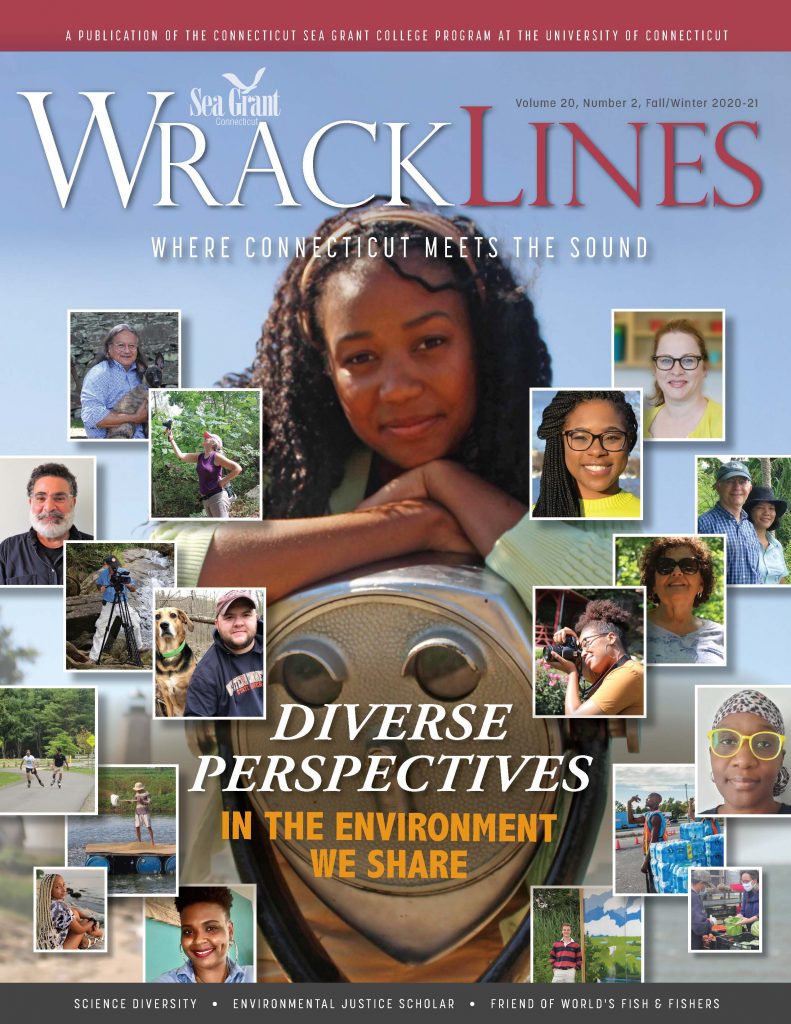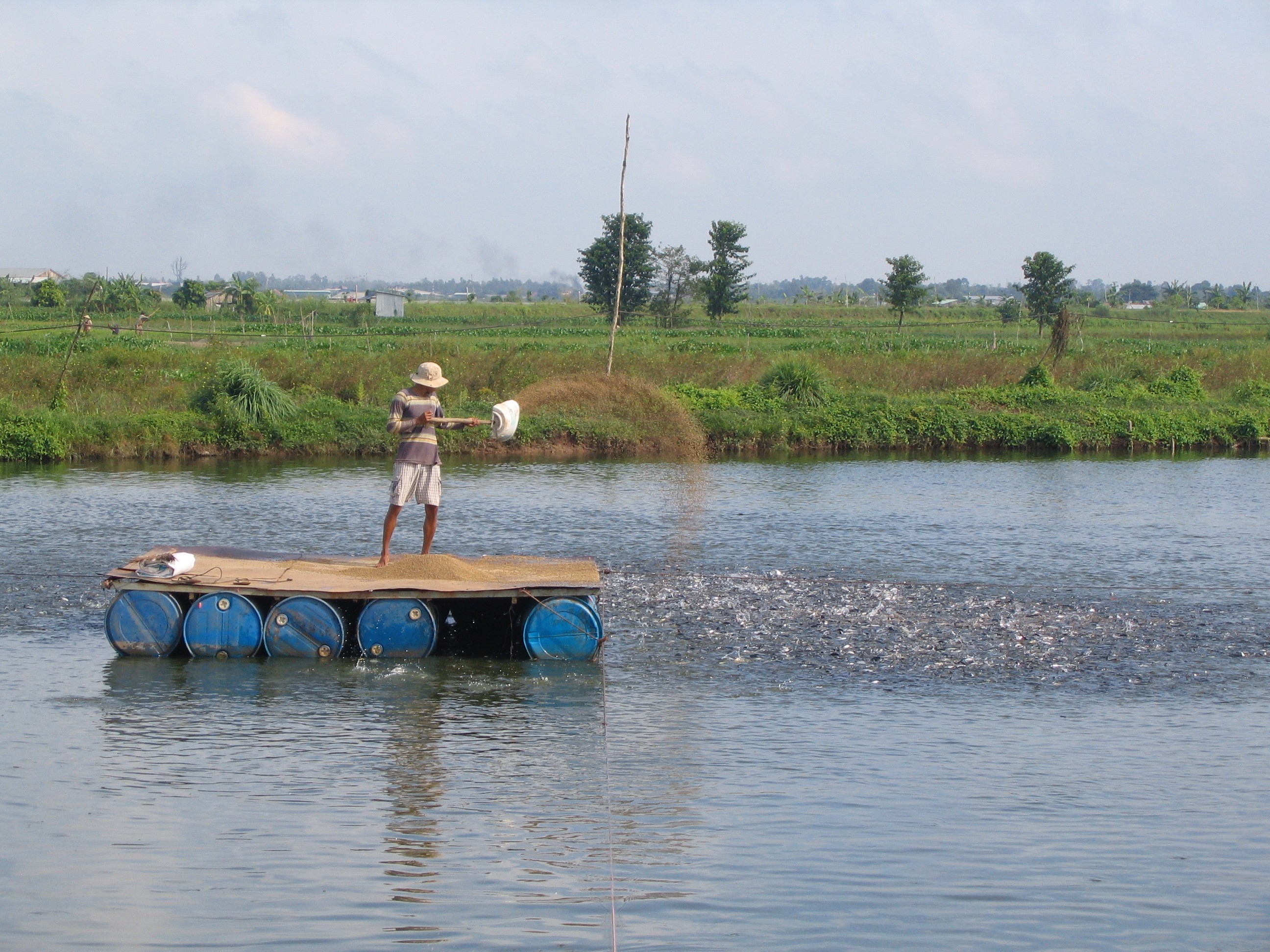[Editor’s Note: This article was originally published in the Fall-Winter 2020-21 issue of Wrack Lines, the magazine of the Connecticut Sea Grant College Program, located at UConn Avery Point.]
Growing up on Cape Cod, Bob Pomeroy spent many hours sailing, clamming and fishing.
He knew commercial fishermen personally, and appreciated their frankness.
“They always said they hated the government telling them what to do,” he recalled.
The more he listened, he began to wonder: was there a better way to ensure the preservation of both fish and fishermen? Could a partnership of fishermen and government regulators work better than the top-down approach?

Finding answers to those questions became a lifelong pursuit. It took him far physically for months at a time from the waters of the boyhood home he loved, but never in spirit. Honoring relationships with both the people and environment of the sea would always guide him.
“It’s really been an exciting life,” said Pomeroy. “I’ve traveled and worked in more than 70 countries. I’ve had this nomad life. I’ve had a lot of homes but I really love the Philippines [where he met his wife Leni]. I have family there and a lot of friends.”
At age 67, Pomeroy is looking back with satisfaction on his career of working on research and development projects with small-scale fisheries in Southeast Asia, Africa, Latin America, and the Caribbean. This spring he retired from his position as an extension specialist and marine resource economist with Connecticut Sea Grant and UConn, a unique position that allowed him to tap outside grants to fund his overseas work, while also contributing to Connecticut Sea Grant projects. He’s not planning on a sedentary retirement, though. Between regular visits from his home in southeastern Connecticut to Cape Cod, where his parents still live, he will consult on a fishery co-management project in Myanmar, among others.
Connecticut Sea Grant Director Sylvain De Guise has traveled twice with Pomeroy to Vietnam and Cambodia to learn about his projects. There, he witnessed first-hand the kind of impacts Pomeroy has had through the influence of his research and direct involvement on the lives of millions of men and women in impoverished communities who depend on the sea to feed their families.
“The outcome of a lot of the work he’s done has helped feed the poor,” De Guise said. “There’s a social justice aspect that is really integrated in the biological management and regulatory processes. He’s helped develop alternative ways of managing fisheries. His work focuses on the intersection of economics and balancing what we harvest from the sea and can grow with protecting the ecosystem.”
He’s been effective, De Guise said, because he builds relationships of respect that cross cultures, language barriers and social divides. Whether that means crowding into a slender canoe to access an aquaculture pond, singing karaoke with fishermen, or meeting with local mayors, national government officials, environmental groups and appealing to the United Nations, Pomeroy has built bridges with them all.
“He has broad recognition and respect from people in fishing communities, NGOs (nongovernmental organizations), government agencies and academics,” De Guise said. “He’s one of the few people I know who is recognized and respected in all four of these areas.”
Pomeroy is quick to credit the many partners he’s worked with. Those range from non-profit agencies to universities in Southeast Asia to the governments of Denmark, the United States and other countries, which helped fund projects to build sustainable fisheries. His work has helped convince fishermen to stop using explosives on sensitive coral reefs to draw fish into their nets; advanced the establishment of tracing systems to ensure sustainable harvests; empowered women in aquaculture operations and fostered cooperation between fishermen to avoid crucial spawning areas so that everyone could benefit from catching fish elsewhere.
“Bob did some very groundbreaking, thoughtful research that really shaped my thinking about how we manage the ocean and fisheries resources,” said John Parks, marine scientist with Tetra Tech, one of the groups Pomeroy has worked with. “He’s become a friend and mentor.”
Pomeroy has brought not only a deep understanding of economics and fisheries to his projects, but also an endearing personality that makes others want to work with him, Parks said.
“He’s such a humble, sincere person, and very passionate about his work,” Parks said. “And he will always call it like he sees it.”
He recalled one project focusing on conserving coral reefs while enacting a sustainable fisheries management program in an area where high-value species such as grouper, sardines and anchovies were being caught.
“Bob kept asking, ‘what about the people?’ He was concerned about peoples’ livelihoods and food security.”
In the end, Parks said, “Bob’s truth” prevailed, and a plan was developed that addressed the needs of both the reefs and the fishermen.
An experience early in his career cemented Pomeroy’s desire to make an impact overseas, where it was needed most. After a few years as an extension agent in South Carolina, he returned to school for his doctorate in natural resource economics from Cornell University. There he met Peace Corps volunteers working on fisheries projects in Southeast Asia, and was immediately intrigued.
“I started to rethink what I wanted to do,” he recalled.
This led to an assignment with the U.S. Agency for International Development (USAID) to a rural fishing community in Leyte Province in the Philippines.
“I lived in this bamboo hut, next to the poorest fishermen,” he said, recalling how young men in the village would sometimes serenade their sweethearts at night from outside their windows. “These were people who gave me everything. I fell in love with the work. I wanted to help empower fishermen to manage their own fish.”
His connection to USAID and other groups working in the Philippines would continue for the rest of his career. Rebecca Guieb, regional and coastal marine specialist for the agency in the Philippines, Pacific and Mongolia, recalled first meeting Pomeroy in the early 1990s when she was part of an NGO and he was working for the WorldFish Center.
“We started our collaboration of fisheries co-management,” she said in an email message. “It was a thoughtful and strategic action that demonstrated the value he places on partnerships.”

In 2005, the two collaborated on a book about fisheries co-management that is still considered a key reference on the subject. In addition to the book, together they also provided technical assistance to Cambodia, Vietnam and the Philippines about sustainable management of fisheries that preserves people’s livelihoods.
“Our collaboration involved the entire fisheries sector of the Philippines,” she said, adding that it involves multiple species of fish and contributes billions annually to the nation’s economy. “I have been blessed to have Bob as a technical co-collaborator and friend for many years and now I can vouch for his genuine love and concern for the fisheries sector, particularly the small scale fishers globally.”
In Vietnam, Pomeroy’s impact has been felt on the ocean tuna fishery, which employs millions there, said Nguyen Thu Hue, founder of the Center for Marinelife Conservation and Community Development. Pomeroy worked with her recently on a value chain analysis for the fishery and on creating a workable electronic system to document and trace the catch. The work was essential in lifting European Union sanctions against the fishery and enacting reforms so that it could be considered “sustainable and modernized,” Hue said.
“Bob is a trusted friend,” she said in an email message. “He always provides good connections, opportunities and nurtured young talent in developing countries for local sustainability in fisheries.”
Nancy Balcom, associate director of Connecticut Sea Grant, described Pomeroy as “the diamond you found and just kept polished.”
She takes pride in knowing that Sea Grant could do its part to help continue doing the kind of work that changes lives for the better.
“He really wants to help people help themselves, to help them to be thoughtful about how they fished,” she said. “I’ve just been in awe of the kinds of changes he has been instrumental in making with his partnerships.”
One of the most significant achievements of his career culminated in 2016 in Cambodia and Vietnam. In those countries, hundreds of thousands of people make their livings by raising snakehead fish through small-scale aquaculture. For many years the fish farmers fed their crop with small “trash fish” that many very poor people also depended on as a main source of protein. Catches were starting to dwindle.
To stop further depletion of the small fish populations, the Cambodian government closed the snakehead fishery in 2005. A year later. Pomeroy began working with USAID and the AquaFish Innovation Lab at Oregon State University to find a solution. A partnership with Can Tho University in Vietnam and other groups was formed.
“We asked, ‘Can we develop a formula feed to substitute as the food source and a sustainable management system for the trash fish?’” Pomeroy recalled.
A rice and soy-based feed was developed by researchers at Can Tho University. At first, the fish farmers were reluctant to use it, and the snakehead weren’t eager consumers either. But with some coaxing, they both came around.
“The fish actually had to be taught to eat it, through different life cycles,” Pomeroy said. “We started working with the people, and the farmers started to like the feed.”
Feed producers in the United States benefited, too, when they started producing the product. By 2016, the snakehead fishery in Cambodia reopened. Farmers in both Vietnam and Cambodia could once again support themselves by growing fish.
“We changed the lives of thousands of people, and allowed wild stocks of fish to recover,” Pomeroy said. “I still have a World Bank-supported project going on in the Mekong River in Cambodia.”



